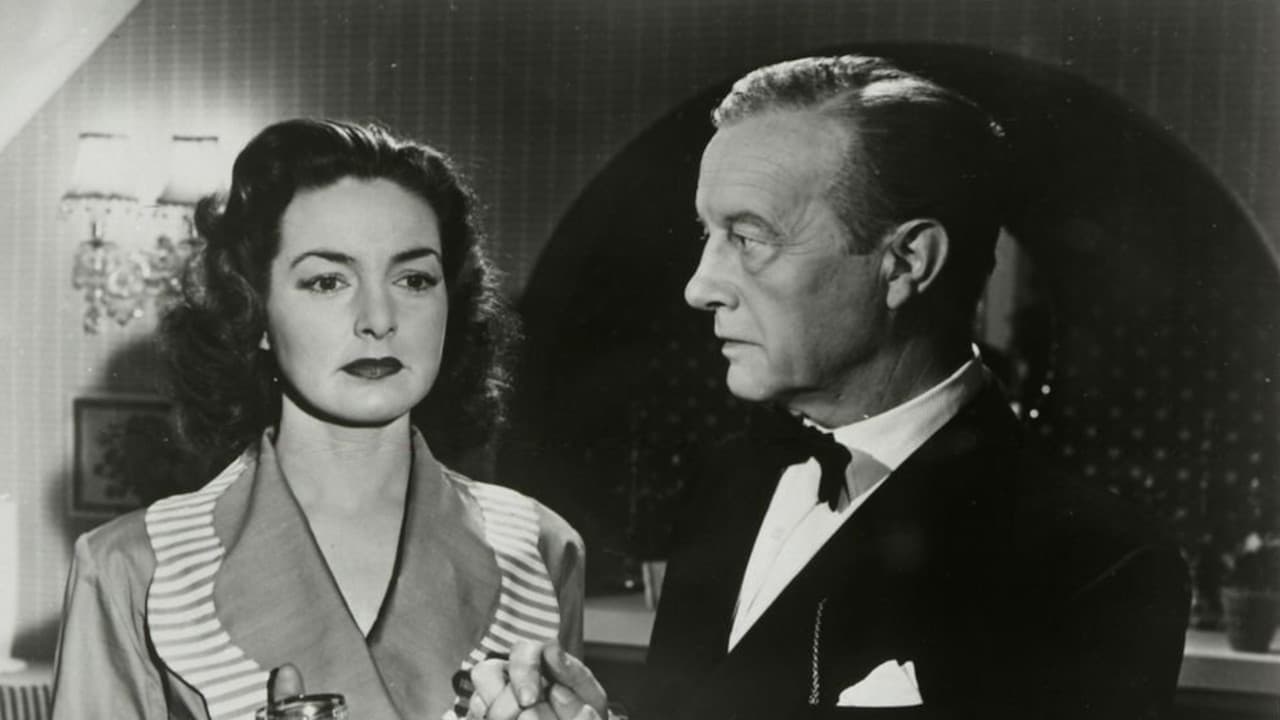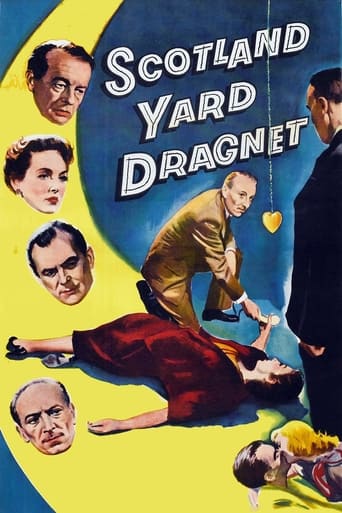

It's hard to decide which is worse – Montgomery Tully's inept, wait-for-the-B-grade-pause direction, or his incredibly rambling, disjointed screenplay (spun out from a stage play by Falkland Cary) with its compendium of dialogue clichés. The music scorer has tried vainly to give the film pace and atmosphere, but is largely defeated by the heavy hand of Mr Tully and his cast of largely flat-footed, second-rate players. In fact, it's a shame to find a fine actress like Kay Callard mixed up – if only briefly – in this woefully extended quota quickie. Patricia Roc and Roland Culver are usually featured in much better films too. Normally bottom-of-the-barrel "B" efforts like The Hypnotist don't waste more than an hour of a picturegoer's time, but this one is spun out to an incredible 92 minutes. (At some stage, the producer had mercy on cinema patrons and shortened the movie to 73 minutes, but I and my brother big-city critics were forced to sit through the full-length version). Production values are negligible.
... View MoreThis is an interesting mystery film about a murder involving hypnotic suggestion by an unscrupulous hypnotist. The story is set in London. The hypnotist is played by the urbane Roland Culver, always impeccably dressed and equally impeccably mannered. In one scene, he stretches his arms forward in order to free his shirt cuffs, encumbered with cufflinks, from the confines of his jacket sleeves, a mannerism rarely seen these days, but once a commonplace amongst gentlemen of the old school. (It signified 'getting down to business', and resembles the pathetic attempts by Prime Minister David Cameron in our own time to show that he is 'getting down to business' by rolling up his sleeves after taking off his jacket. We are expected to believe that by doing that, Shirtsleeve Dave will save the economy from collapse. But pull the other shirtsleeve!) Culver plays a retired psychiatrist who has written numerous books on psychiatry and on 'hypnosis and the unconscious mind'. He is persuaded by his 'almost niece', played by pert Patricia Roc, to treat her fiancée, a test pilot who has survived a crash, and who has sudden and recurring fits inspired by an unknown subconscious fear. Eventually, the trouble is traced to the traumatic death of his mother when he was a child, and his repression of the horrific memories associated with the incident. But in the course of treatment by Culver, the fiancée, played by the rather boring Canadian actor Paul Carpenter (who died at the age of only 42 in 1964), proves so suggestible, that Culver decides to make use of him for a nefarious purpose. Culver's ex-wife lives upstairs in the same building, and he wants to kill her, so he hypnotizes Carpenter and instructs him to go upstairs and do it, but to remember nothing of it afterwards (what is known as post-hypnotic amnesia). The murder duly takes place, and a police investigation seems to be getting nowhere. Will Patricia Roc and Paul Carpenter be able to figure out the truth in time? And if so, how can they prove it? This film is important for containing a lengthy scene of Chris Barber and his Jazz Band playing in a London club, which all admirers of Chris Barber will want to see. (He played 'British Dixieland', and did it very well.) The film was released in 1957 but filmed in 1956. There is a lengthy portion of the film where we see Carpenter wandering around London in a daze, having fled a hypnosis session before being properly aroused from the hypnotic state. (Yes, this sort of thing can happen.) It is astonishing to see the streets of London practically devoid of traffic apart from a few old-fashioned taxis, and there is also a conspicuous lack of pedestrians. London, which today is so over-crowded and teeming that the crowds are spilling onto the streets everywhere and the underground cannot hold them so that at some hours of the day it can take 20 minutes even to squeeze into an underground station while one is left outside in the bad weather, was then practically a ghost town even ten years after the War. Anyone interested in the history of London will want to see these many scenes of London in 1956, with its conspicuous lack of foreigners and sleepy state of inactivity. This film is useful in portraying the criminal abuse of hypnosis, and though there is a feeble and unconvincing declaration at the end that it could not happen, the truth about the criminal abuses of hypnosis may be found in the book OPEN TO SUGGESTION, which gathers together 150 years of case histories of this sort of thing. The film was made under the title of THE HYPNOTIST but released as Scotland YARD DRAGNET, possibly to heighten its commercial appeal. It was directed by Montgomery Tully (1904-1988) and based upon a play by Falkland L. Cary (1987-1989). The film is interesting despite being somewhat mediocre. When Carpenter is wandering around in a trance state, he meets a young girl who takes him in, feeling sorry for him because he cannot remember his name or where he comes from, and doesn't know anyone but her. These scenes are poignant and Kay Callard with her big enquiring eyes is very effective as this 'Jazz Club Blond', as she is called in the cast list. She appeared in 36 films, but was never sufficiently recognised. She is one of the many British actresses to be unjustifiably forgotten, even though she lived to the age of 74, dying in 2008 in Peterborough. She appeared together with Paul Carpenter again in the B crime thriller ASSIGNMENT REDHEAD in 1958. Anyone interested in fifties fashions will be interested to see Patricia Roc's clothes in this film. One skirt has a multiple layered petticoat so thick that the skirt spreads out like a portable tent and gyrates when she turns. Her mannerisms are also perfect 'fifties woman' mannerisms, with a frozen arched brow and a permanently indulgent smile which eagerly awaits the next clever remark which any man cares to make to her. We have come some way since then, though whether men are any cleverer I doubt, especially as they no longer have submissive and indulgent smiles from expectant women encouraging them to say things.
... View MoreI rated this film 6/10 as just above average.The other reviewer disclosed the murderer but anyone who watches this film could easily work it out.This because there are relatively few characters to choose from and apart from the obvious "red herring" it could only be one person.Audiences are so versed and educated in modern crime thrillers so they steer past the obvious, to wit: 1.Do not suspect the obvious hero whom the author points you towards.2.Ignore slightly sinister extras who have little or no dialogue - the audience cannot feel a rapprochement with them.3.When the motive appears in the screenplay suspect the character with the most to gain.I vaguely remember Paul Carpenter (the lead actor) who was a Canadian actor from Montreal and who appeared quite regularly on British TV in the 50s and early 60s but his resume is strictly "B" rated and the British actors are similarly not of the first box office magnitude.The whole film reminds me of a typical "B" feature production value and budget film of the 50s in my youth (I am 64 now) when the cinema goer first had a cartoon, then Pathe News, then the "B" feature and finally "The Big Film", for the price of admission.I always like to look at the cars, taxis, lack of parking restrictions in London shown in films during the 50s and of course the clothes fashions and manner of speaking.It's part of the fascination for me and why I like to buy dvds of this vintage.
... View MoreAka Scotland Yard Dragnet (a slight oxymoron as it features neither a police dragnet nor, till the final part of the film, anyone from Scotland Yard.) Val Neal (Paul Carpenter) is a pilot who ejects after a test-flight goes wrong. "He'll break his neck at that speed" exclaims some bod at ground control. We see, potentially, a dead man floating on a parachute, lord of the flies style. Carpenter isn't dead though (it's just his acting bum tish!) although he suffers fits; blackouts which he's unaware of. These are hilarious to watch - all phoney hyperventilation and swooping orchestral soundtrack. This is all consistent with a general bemusement about mental illness. When his fiancé (Pat Roc) is informed that his illness is psychosomatic, she replies: "What does that mean?" Pat brings in her uncle (Roland Culver), a sort of psychiatrist/ hypnotist, to treat Carpenter; although his treatment appears to involve having Wang the houseboy serve up cigars and fortified wine in the smoke-filled library.Pretty soon we realise that something's amiss not so much with the patient but with sinister Dr Culver; his intimate questions reveal a less than wholesome interest in his niece. Thrown into the mix is annoying bitch Miss Barbara Barton "she writes lurid love stories and sells them by the hundred thousand" who Culver strangles before offering Carpenter up to the cops (she's the doc's ex wife).In the meantime, Carpenter has wondered off round London, still hypnotised, and ended up in the Downbeat Club. It's all coke (no, not that kind) and coffees here but he still manages to get himself picked up by a character billed only as Jazz Club Blond.All in all, this film does for hypnotism what Reefer Madness did for marijuana.
... View More